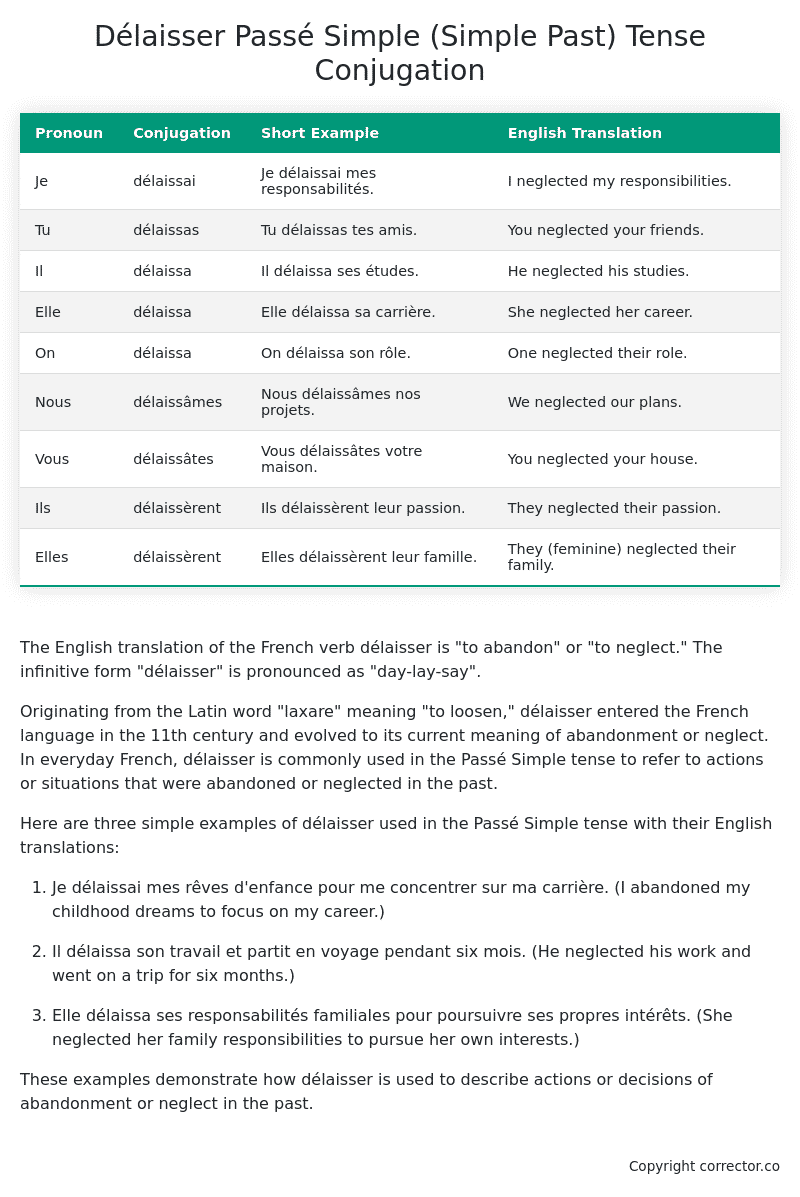Passé Simple (Simple Past) Tense Conjugation of the French Verb délaisser
Introduction to the verb délaisser
The English translation of the French verb délaisser is “to abandon” or “to neglect.” The infinitive form “délaisser” is pronounced as “day-lay-say”.
Originating from the Latin word “laxare” meaning “to loosen,” délaisser entered the French language in the 11th century and evolved to its current meaning of abandonment or neglect. In everyday French, délaisser is commonly used in the Passé Simple tense to refer to actions or situations that were abandoned or neglected in the past.
Here are three simple examples of délaisser used in the Passé Simple tense with their English translations:
-
Je délaissai mes rêves d’enfance pour me concentrer sur ma carrière.
(I abandoned my childhood dreams to focus on my career.) -
Il délaissa son travail et partit en voyage pendant six mois.
(He neglected his work and went on a trip for six months.) -
Elle délaissa ses responsabilités familiales pour poursuivre ses propres intérêts.
(She neglected her family responsibilities to pursue her own interests.)
These examples demonstrate how délaisser is used to describe actions or decisions of abandonment or neglect in the past.
Table of the Passé Simple (Simple Past) Tense Conjugation of délaisser
| Pronoun | Conjugation | Short Example | English Translation |
|---|---|---|---|
| Je | délaissai | Je délaissai mes responsabilités. | I neglected my responsibilities. |
| Tu | délaissas | Tu délaissas tes amis. | You neglected your friends. |
| Il | délaissa | Il délaissa ses études. | He neglected his studies. |
| Elle | délaissa | Elle délaissa sa carrière. | She neglected her career. |
| On | délaissa | On délaissa son rôle. | One neglected their role. |
| Nous | délaissâmes | Nous délaissâmes nos projets. | We neglected our plans. |
| Vous | délaissâtes | Vous délaissâtes votre maison. | You neglected your house. |
| Ils | délaissèrent | Ils délaissèrent leur passion. | They neglected their passion. |
| Elles | délaissèrent | Elles délaissèrent leur famille. | They (feminine) neglected their family. |
Other Conjugations for Délaisser.
Le Present (Present Tense) Conjugation of the French Verb délaisser
Imparfait (Imperfect) Tense Conjugation of the French Verb délaisser
Passé Simple (Simple Past) Tense Conjugation of the French Verb délaisser (You’re reading it right now!)
Passé Composé (Present Perfect) Tense Conjugation of the French Verb délaisser
Futur Simple (Simple Future) Tense Conjugation of the French Verb délaisser
Futur Proche (Near Future) Tense Conjugation of the French Verb délaisser
Plus-que-parfait (Pluperfect) Tense Conjugation of the French Verb délaisser
Passé Antérieur (Past Anterior) Tense Conjugation of the French Verb délaisser
Futur Antérieur (Future Anterior) Tense Conjugation of the French Verb délaisser
Subjonctif Présent (Subjunctive Present) Tense Conjugation of the French Verb délaisser
Subjonctif Passé (Subjunctive Past) Tense Conjugation of the French Verb délaisser
Subjonctif Imparfait (Subjunctive Imperfect) Tense Conjugation of the French Verb délaisser
Subjonctif Plus-que-parfait (Subjunctive Pluperfect) Tense Conjugation of the French Verb délaisser
Conditionnel Présent (Conditional Present) Tense Conjugation of the French Verb délaisser
Conditionnel Passé (Conditional Past) Tense Conjugation of the French Verb délaisser
Conditionnel Passé II (Conditional Past II) Tense Conjugation of the French Verb délaisser
L’impératif Présent (Imperative Present) Tense Conjugation of the French Verb délaisser
L’impératif Passé (Imperative Past) Tense Conjugation of the French Verb délaisser
L’infinitif Présent (Infinitive Present) Tense Conjugation of the French Verb délaisser
L’infinitif Passé (Infinitive Past) Tense Conjugation of the French Verb délaisser
Le Participe Présent (Present Participle) Tense Conjugation of the French Verb délaisser
Le Participe Passé (Past Participle) Tense Conjugation of the French Verb délaisser
Struggling with French verbs or the language in general? Why not use our free French Grammar Checker – no registration required!
Get a FREE Download Study Sheet of this Conjugation 🔥
Simply right click the image below, click “save image” and get your free reference for the délaisser Passé Simple tense conjugation!

Délaisser – About the French Passé Simple (Simple Past) Tense
Formation
Usage
Narration
Historical Context
Interactions with other tenses
Passé Composé
Imparfait
Conditional and Subjunctive
Summary
I hope you enjoyed this article on the verb délaisser. Still in a learning mood? Check out another TOTALLY random French verb conjugation!


